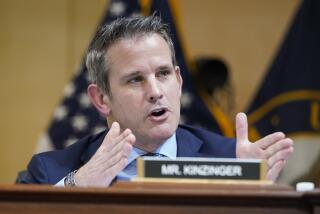Campaign Seen as Launching Pad for Duke : Politics: The ex-klan leader is in a hard-fought Louisiana gubernatorial race. Analysts view the Southern presidential primaries as the next step.
- Share via
NEW ORLEANS — With his candidacy seemingly surging in the polls, former Ku Klux Klan leader David Duke is striving to whip up last minute support that would help him use today’s Louisiana gubernatorial primary as a launching pad for his national ambitions. These include, many here believe, a challenge to President Bush in the 1992 Southern primaries.
Ironically, Duke’s latest maneuver in this three-way battle against Republican Gov. Buddy Roemer and former Democratic Gov. Edwin W. Edwards seems to have been borrowed right out of the Bush 1988 campaign playbook.
Just two days before the election, he called a press conference to remind voters of a 1988 incident in which a convicted murderer, who worked at the governor’s mansion killed a member of his own family while on furlough. Duke accused Roemer of trying to cover up the incident, which he likened to the case of furloughed killer Willie Horton that Bush used with great success against his 1982 Democratic opponent, Michael S. Dukakis.
“Buddy Roemer is a Michael Dukakis Harvard-style liberal, long on rhetoric and soft on violent criminals,” Duke declared.
“David Duke’s fangs of racial divisiveness are there for all to see,” said Roemer’s press secretary, Gordon Hensley.
The harshness of this exchange, which was reported on the front page of the New Orleans Times-Picayune, the state’s largest newspaper on the eve of the vote, illustrates the extent to which this primary campaign is boiling down to a battle for white votes between Duke and Roemer, who switched to the GOP after being elected as a Democrat.
“He (Duke) is competing more with Roemer than Edwards right now because Roemer has more white support for him to target,” said Susan Howell, director of the University of New Orleans’ survey research center.
For his part, Edwards’ chances of surviving the primary depend on his ability to generate a huge turnout of black voters, who make up about 25% of the electorate. The former Democratic chief executive said in a telephone interview that he expects to get 80% of whatever number of blacks do turn out, and to put that together with his base of Roman Catholic working class white supporters. He believes they will make up about 20% of the total white vote.
Several other candidates are also on the ballot but are not expected to have a significant impact .
Unless one of the contenders gets more than 50% of the total vote today the top two vote-getters will compete in a runoff next month.
A poll released this week by Mason Dixon Opinion Research showed Roemer with 31% of the vote to 30% for Edwards and 29% for Duke, which represented an increase for him over earlier surveys. But as pollsters are quick to acknowledge, surveys of this election are less dependable than most polls, because of the difficulty of gauging Duke’s strength.
“Whites don’t like to be labeled racist,” pollster Howell said. Pollsters learned this lesson last year when Duke got 44% of the vote, including about 60% of the white vote, in a contest with Democratic Sen. J. Bennett Johnston. That was a far better showing than their pre-election surveys indicated.
Even if Duke does make the runoff in today’s vote, few expect that he would be able to win the governorship. Nevertheless, besting either incumbent governor Roemer, who has the support of most of the state’s political and business Establishment, or Edwards, the only three-term governor in the state’s history, would be a huge feather in his cap.
While Duke himself professes to have no political ambitions beyond the governorship, analysts point out that entering the Southern primaries against Bush would be the next logical step in his steady effort to gain national prominence.
In 1988, after an abortive effort to gain the Democratic presidential nomination which yielded no delegates, Duke ran on the Populist Party ticket in the general election, receiving 48,000 votes in the 12 states where he was on the ballot.
“If he can knock off a major politician, it establishes him as a formidable political power,” said John Maginnis, editor of the Louisiana Political Review, a longtime Duke watcher.
“Duke could run a pretty good national race,” said presidential biographer Stephen Ambrose, who teaches history here at the University of New Orleans. He said Duke appeals to much the same combination of racial resentment and populist discontent that fired the political success of Alabama Gov. George C. Wallace two decades ago. “But he is way ahead of Wallace,” Ambrose said. “He is more youthful, better looking and smoother.”
More to Read
Get the L.A. Times Politics newsletter
Deeply reported insights into legislation, politics and policy from Sacramento, Washington and beyond. In your inbox twice per week.
You may occasionally receive promotional content from the Los Angeles Times.








